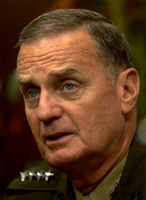Did you miss it? Yesterday was the 61st anniversary of the United Nation General Assembly’s adoption of the Universal Declaration of Human Rights. President Barack Obama, as he was leaving for Oslo to accept the Nobel Peace Prize, declared December 10 Human Rights Day. To help mark it, his national security advisor, the retired Marine General James L. Jones, at left, invited representatives of a number of human rights and related groups including CPJ to meet with him and other senior national security advisors in the White House.
We met in the Roosevelt Room to discuss what FDR called “the human condition.” “I reiterated the president’s strong and unwavering commitment to the advancement of human rights and democracy around the world, including the right to choose one’s leaders, to speak one’s mind, to assemble freely, and to worship as one pleases,” read Gen. Jones’ statement on Human Rights Day.
I told the general and the assembled National Security Council directors how pleased CPJ was with Obama’s remarks on World Press Freedom Day in May about both unsolved journalist murders in many nations around the world, and the ongoing jailing of journalists in many other nations. (CPJ just released our imprisoned list for 2009, and half of the jailed journalists are online journalists and nearly half are freelancers.) I also volunteered that the POTUS’ recent granting of an exclusive interview to Cuban blogger Yoani Sánchez shortly after she was beaten by state security agents was nothing less than a brilliant move.
But also I noted that the administration still had more to do to advance human rights and press freedom. In particular, the Obama administration needs to end the U.S. military’s ongoing practice of detaining journalists without charging them with a crime or giving them due process of law. The practice began with the Bush administration.
No fewer than 14 journalists have been held behind bars without ever being charged in Guantanamo Bay, Iraq, or Afghanistan. All but one were later released, including Sami al-Haj, a Sudanese cameraman for Al-Jazeera who was held in Guantanamo for more than six years. The one journalist still in U.S. custody is an Iraqi photographer for Reuters, Ibrahim Jassam, who has been held for the past 14 months in Iraq. Senators on both sides of the aisle—from the veteran Indiana Republican Richard Lugar to the Democrat from Obama’s own state of Illinois, Richard Durbin—have spoken about the need for the United States to set an example in words as well as in deeds for other nations when it comes to human rights and press freedom around the world.
CPJ has been long asking—since January when we sent then-President elect Obama a letter—the new administration to announce that it is ending the U.S. military practice of holding journalists without charging them, and to start with Jassam, by either releasing him or charging him with a crime. We can only wait and see how Gen. Jones might advise the president to handle the matter. If administration officials wanted to peg it to human rights, they still have time. Besides proclaiming December 10 Human Rights Day, President Obama also proclaimed the ensuing days Human Rights Week.
